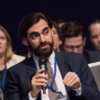Paul Fehlinger
Paul Fehlinger is the Co-Founder and Deputy Director of the Internet & Jurisdiction Policy Network[1].
 |
 |
| Affiliation: | Internet & Jurisdiction Policy Network |
| Country: | France |
| LinkedIn: | |
| Twitter: |
Internet & Jurisdiction Policy Network
The Internet & Jurisdiction Policy Network addresses the tension between the cross-border nature of the internet and national jurisdictions. Its Paris-based Secretariat facilitates a global multistakeholder process to enable transnational cooperation. Participants in the Policy Network work together to preserve the cross-border nature of the Internet, protect human rights, fight abuses, and enable the global digital economy. Since 2012, the Internet & Jurisdiction Policy Network has engaged more than 200 key entities from six stakeholder groups around the world.
Responding to the pressing needs of the global community, the Internet & Jurisdiction Policy Network enables the development of policy standards and shared cooperation frameworks that are as transnational as the internet itself in order to promote legal interoperability and establish due process across borders. The work of the Internet & Jurisdiction Policy Network is currently structured around three thematic programs: Data, Content, and Domains.
Through the Global Conference, as well as regional and thematic meetings, its Secretariat facilitates a neutral dialogue process to build trust among the different actors and help them develop the operational solutions necessary for the coexistence of diverse laws on the cross-border Internet. The first Global Conference of the Internet & Jurisdiction Policy Network was organized in November 2016 in partnership with France, the second Global Conference in February 2018 in partnership with Canada[2]. The third Global Conference will take place in June 2019 in partnership with Germany. The Global Conferences are institutionally supported by the OECD, UNESCO, Council of Europe, European Commission, and ICANN.
Global Internet Governance
A frequent speaker in international fora, Paul Fehlinger was a panelist, presenter or moderator at venues such as at the United Nations[3], EuroDIG[4], OECD[5], the Council of Europe[6], the G7 Cyber Group[7], or the WTO[8]. He was appointed to the Advisory Network of the Global Commission on Internet Governance chaired by Carl Bildt[9] and to the Working Group on the Rule of Law of the Freedom Online Coalition[10]. Paul was also a participant in the Committee of experts on cross-border flow of Internet traffic and Internet freedom at the Council of Europe[11] and in the World Economic Forum's Future of the Internet Initiative.
His comments on the future of the global Internet and digital economy were featured in The Economist[12], Fortune[13], Slate[14], POLITICO[15], the Swiss Neue Züricher Zeitung[16], the German Die Zeit[17], Internet Policy Review[18], Deutschlandfunk[19], and by the Council on Foreign Relations[20], as well as by the Freedom Online Coalition[21], among others. POLITICO wrote that "Paul Fehlinger isn’t a household name like Mark Zuckerberg. But the Paris-based policy wonk has an ambition that’s just as big and far-reaching as the Facebook chief’s digital empire: fixing the internet."[22]
Education
Paul specialized in Internet politics and new modes of global governance at Sciences Po Paris (Master in International Relations) and the Max Planck Institute for the Study of Societies. He was a scholar of the German National Merit Foundation (Studienstiftung). Paul also holds a BA in European Studies from Maastricht University and a degree in French Studies from the Sorbonne. [1]
Languages
Paul speaks English, French and German.[1]
References
- ↑ 1.0 1.1 1.2 LinkedIn From LinkedIn.com. Retrieved 23 February 2015.
- ↑ https://www.internetjurisdiction.net/news/outcomes-of-the-2nd-global-conference-of-the-internet-jurisdiction-policy-network
- ↑ https://www.youtube.com/watch?v=qQibakQP_TQ
- ↑ http://www.internetjurisdiction.net/events/eurodig-2013/workshop-8/
- ↑ http://www.internetjurisdiction.net/oecd-cdep-2014/ , http://www.internetjurisdiction.net/events/oecd-forum-idea-factory-2014/
- ↑ http://www.internetjurisdiction.net/events/coe_net_transparency_2013/
- ↑ http://www.internetjurisdiction.net/event/i-j-presents-work-and-gijc-2016-outcomes-to-g7-cyber-group
- ↑ https://www.wto.org/english/forums_e/public_forum16_e/wrksesions_e/session81_e.htm
- ↑ https://www.ourinternet.org/#research_advisers
- ↑ https://www.freedomonlinecoalition.com/how-we-work/working-groups/working-group-2/
- ↑ http://www.coe.int/t/dghl/standardsetting/media/MSI-INT/MSI-INT%20List%20Participants%202nd%20meeting.pdf
- ↑ http://www.economist.com/news/international/21709531-left-unchecked-growing-maze-barriers-internet-will-damage-economies-and
- ↑ http://fortune.com/2016/04/08/internet-jurisdiction-trade/
- ↑ http://www.slate.com/articles/technology/future_tense.html
- ↑ https://www.politico.eu/article/google-facebook-alphabet-twitter-us-congress-senate-house-of-representatives-digital-advertising/
- ↑ http://www.nzz.ch/aktuell/startseite/das-ende-des-internets-1.18239023
- ↑ http://www.zeit.de/digital/internet/2014-02/regierungen-treiben-internet-fragmentierung-voran
- ↑ http://policyreview.info/articles/news/cyberspace-fragmentation-internet-governance-debate-beyond-infrastructure/266
- ↑ http://www.deutschlandfunk.de/internet-manuskript-metropolis-und-moloch.740.de.html?dram:article_id=289130
- ↑ http://blogs.cfr.org/cyber/2016/05/09/a-legal-arms-race-threatens-the-future-of-the-internet/
- ↑ https://www.freedomonlinecoalition.com/how-we-work/working-groups/working-group-2/wg2-rule-of-law-blog-series-2/
- ↑ https://www.politico.eu/article/internet-governance-ottawa-regulation-balkanization-splinternet-global-jurisdiction-policy-network/